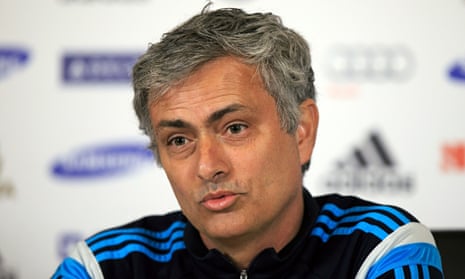José Mourinho has offered an insight into his man-management tricks, such as criticising a player in the press to inspire a reaction from him, but he insisted that none of them have been needed this season.
The Chelsea manager said that his squad might have benefited last season from what he calls “confrontational leadership”, even if he wondered whether many of them would have been able to handle his brand of it.
But he feels that they have matured as a group and, before Sunday’s Premier League visit to Hull City and despite recent setbacks, he offered the impression that he was content with how the season had gone.
Chelsea have won the Capital One Cup and they are six points clear at the top of the table with one game in hand. The principal disappointment has been the Champions League last-16 exit against Paris Saint-Germain and Mourinho has suggested, on several occasions, that Chelsea have been the target of a media-driven campaign, which has led to bad decisions against them.
“This season, I don’t need confrontational leadership,” Mourinho said. “Last season, I felt I needed it a few times but I didn’t think there were many of them ready for that. But this season, I don’t need that because in motivational terms, in responsibility terms, I am happy with everything. Things are going in the direction I want.
“Obviously, you can say: ‘But you lost in the Champions League and you lost against Bradford [in the FA Cup].’ But, generally, the way they work, behave, live together, their motivations, their responsibilities, their frustrations, the way they react to the negative and positive moments, the absence of complacency: all this is going well. I just need to be present. I don’t need to be a big leader, or even try to find strategies as a leader.”
Mourinho described confrontational leadership as being “when you are ready to provoke your players, to try to create some conflict, with the intention to bring out the best from them”.
He said that he employed purely psychological means; he is not the type, for example, to pin a player up against the wall. “I’m not a big guy,” Mourinho said, with a smile. “How might I do it? Criticise a player in the media – try to provoke a reaction from him of anger, of not being happy with his manager, of trying to show that I am not right.”
Mourinho recalled one of his more subtle strategies from his time at Internazionale, when he had Zlatan Ibrahimovic in his attack in 2008-09. He would show no emotion whenever Ibrahimovic scored and, as the striker became more and more determined to make him react, so he scored more and more incredible goals. “Was I aware that it annoyed him? Annoyed, no. But provoke, yes,” Mourinho said.
Mourinho was publicly critical of Eden Hazard last season, saying that the winger was not “ready to sacrifice himself 100% for the team”. This season, Hazard has been among the league’s best players and Mourinho said that he deserved to be named as the Player of the Year.
